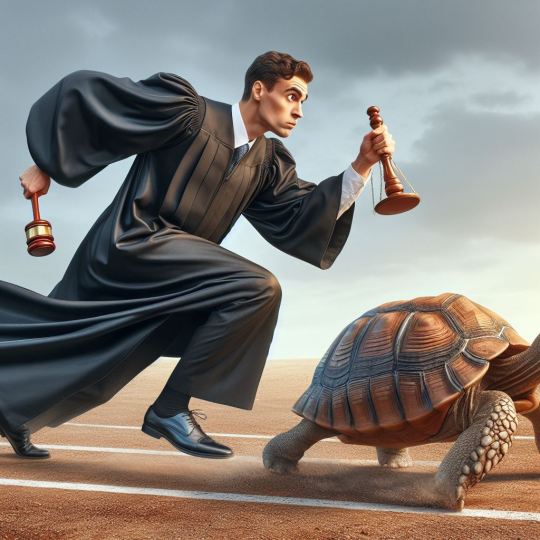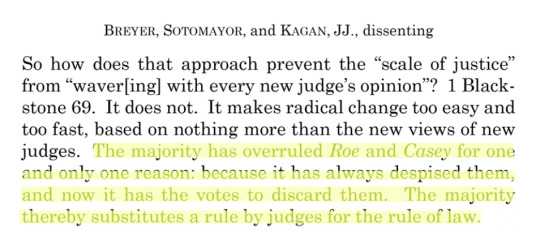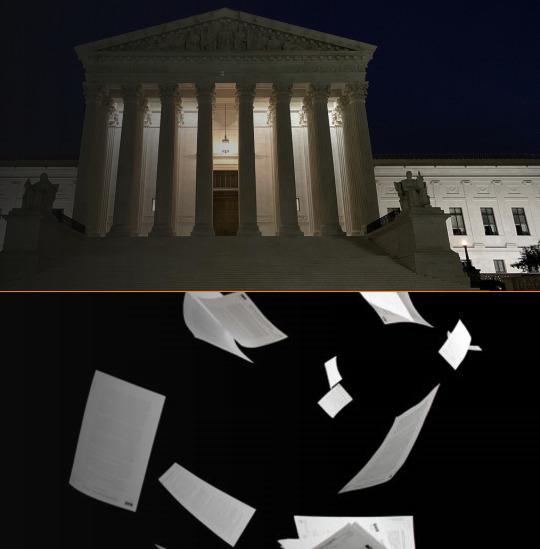#Justice Sotomayor
Text

Justice Sotomayor elegantly sums up how today's decision is "no victory for religious liberty," but a blow at the separation of church and state that protects us all in her dissent.
#justice sotomayor#puerto rico#puertorriqueños#boricuas#latinos#mujeres puertorriqueñas#supreme court#the supreme court#the separation of church and state#usa in crisis#usa politics#usa news#roe v wade#politics#united states#abortion#america#womens rights#philadelphia#philly#american politics#american christianity#sonia sotomayor#Justice Sonia Sotomayor
2 notes
·
View notes
Text
What’s the Holdup in OT 2023?
Last term was supposed to be different. The Court faced the leak of the Dobbs draft opinion in May of 2022 and all signs pointed at that point to the Court’s officers expending effort to attempt to prevent such an instance from recurring. This effort in deterrence potentially slowed the decision release process for the 2022 Supreme Court term which started in October of the same year.
The Court…

View On WordPress
0 notes
Text

0 notes
Text
On Thursday, Justice Neil Gorsuch released a 26-page opinion venting outrage about a legal dispute that does not exist, involving websites that do not exist. Yet this case, built on imaginary grounds, will have very real consequences for LGBTQ consumers, and for anti-discrimination laws more broadly. All of the Court’s Republican appointees joined Gorsuch’s opinion in 303 Creative v. Elenis.
That said, the fake dispute that Gorsuch imagines in his 303 Creative opinion involves a reasonably narrow legal question.
In the past, Christian right advocates have sought sweeping exemptions from state and federal civil rights laws, rooted in their expansive notion of “religious liberty.” Often, these lawsuits claimed that the Constitution’s safeguards for people of faith allow anyone who objects to LGBTQ people on religious grounds to defy any law prohibiting anti-LGBTQ discrimination.
303 Creative involves a much narrower dispute. The case centers on Lorie Smith, a website designer who wishes to expand her business into designing wedding websites — something she has never done before. She says she’s reluctant to do so, however, because she fears that if she designs such a website for an opposite-sex couple, Colorado’s anti-discrimination law will compel her to also design wedding websites for same-sex couples. And Smith objects to same-sex marriages.
As Gorsuch summarizes her claim, Smith “worries that, if she [starts designing wedding websites,] Colorado will force her to express views with which she disagrees.”
This is not a religious liberty claim, it is a free speech claim, rooted in well-established law, which says that the First Amendment forbids the government from compelling people to say something that they would rather not say. In ruling in Smith’s favor, the Court does not say that any religious conservative can defy any anti-discrimination law. It simply holds that someone like Smith, who publishes words for a living, may refuse to say something they don’t want to say.
The full implications of Gorsuch’s opinion are not entirely clear. In the past, religious conservatives have argued that artists and artisans of all kinds — including bakers, photographers, and floral arrangement designers — should also be allowed to discriminate under the First Amendment, because all artistic work necessarily entails some kind of expression. Gorsuch punts on this question, writing that “hypotheticals about photographers, stationers, and others, asking if they too provide expressive services covered by the First Amendment,” are not present in the 303 Creative case.
And it is worth emphasizing that the particular kind of work that Smith does, writing words on a publicly available website, fits more snugly within the First Amendment than a similar claim brought by a wedding cake designer or a florist.
Before this case was argued, I wrote that if Lorie Smith had been approached by a same-sex couple and refused to design a wedding website for them, and if she had then been sued for refusing to do so, then she would have a very strong First Amendment defense against such a suit. As the Supreme Court said in Rumsfeld v. Forum for Academic and Institutional Rights (2006), “freedom of speech prohibits the government from telling people what they must say.” And that includes the right of a web designer to refuse to write words on a website that they do not wish to write.
But none of these events have actually happened. And, for that reason, the Supreme Court should have dismissed the case.
THIS CASE SHOULD HAVE NEVER MADE IT THIS FAR
The frustrating thing about this case is that it involves an entirely fabricated legal dispute. Again, Lorie Smith has never actually made a wedding website for a paying customer. Nor has Colorado ever attempted to enforce its civil rights law against Ms. Smith. Indeed, in its brief to the Supreme Court, Colorado expressed doubt that its anti-discrimination law would even apply to Smith.
Yet Gorsuch’s majority opinion repeatedly paints Smith as a hapless victim, oppressed by wicked state officials who insist that she must proclaim a dogma that she denies. As he writes in the very first paragraph of his opinion, “Colorado does not just seek to ensure the sale of goods or services on equal terms. It seeks to use its law to compel an individual to create speech she does not believe.”
This claim is simply untrue. Colorado has not brought any enforcement action against Smith, or taken any other step to compel her to say anything at all — or to design any website that she does not want to design. Nor has anyone ever sued Smith for allegedly violating Colorado’s anti-discrimination law.
Indeed, in one particularly amusing turn, Smith alleged during an early stage of this litigation that she was approached by a man about doing some design work for his wedding to another man. Yet, after the New Republic’s Melissa Gira Grant contacted this man, she learned that he never reached out to Smith — and that he was married to a woman.
These facts matter because federal courts, including the Supreme Court, do not have jurisdiction to decide hypothetical cases. As a unanimous Supreme Court held in Texas v. United States (1998), “a claim is not ripe for adjudication if it rests upon ‘contingent future events that may not occur as anticipated, or indeed may not occur at all.’” So the Court should have told Smith to go away and come back when she had a real dispute with the state of Colorado.
303 Creative, moreover, is the second time Gorsuch has taken such liberties with the truth in order to rule in favor of a religious conservative. Almost exactly one year ago, Gorsuch handed down the Court’s decision in Kennedy v. Bremerton School District (2022), a case about a public school football coach who, after games, would walk to the center of the 50-yard line and ostentatiously kneel down and pray before students and spectators — often while surrounded by players, community members, and even members of the press.
Indeed, in her dissent in Bremerton, Justice Sonia Sotomayor included a photo of Coach Kennedy holding such a prayer session, as a throng of uniformed football players and other individuals kneel with him, and as people holding video cameras look on.
And yet, Gorsuch’s opinion in Bremerton claimed that Kennedy merely wanted to offer a “short, private, personal prayer,” and then Gorsuch ruled in favor of Kennedy based on this fabricated version of Kennedy’s actual conduct.
Needless to say, this is aberrant behavior by a Supreme Court Justice — and really by six Supreme Court justices, since all of the Court’s Republican appointees joined Gorsuch’s decisions in 303 Creative and Kennedy.
#us politics#news#vox#2023#us supreme court#SCOTUS#303 Creative v. Elenis#republicans#conservatives#justice neil gorsuch#religious liberty#republican homophobia#anti lgbtq discrimination#lgbtqia+ rights#lgbtqia+#Lorie Smith#Rumsfeld v. Forum for Academic and Institutional Rights#Texas v. United States#Kennedy v. Bremerton School District#justice sonia sotomayor
151 notes
·
View notes
Text
the girlbossification of ruth bader ginsburg has to be one of the most just plain annoying aspects of white liberal feminism. like it's not as actively harmful as a lot of other shit obviously. but it is soooooo annoying. if I never see another notorious rbg tote bag as long as I live it will be too soon
#her opinions and amicus' in many cases were iconic! not denying that certainly. she is absolutely AMONG the better justices in us history#HOWEVER her record on policing/the carceral system is very bad! genuinely bad!#and she just would not hold the conservative justices accountable. her and kagan are way too placating#and then she refused to retire in 2009 when there was a sitting democratic president and a fucking DEMOCRATIC SUPER MAJORITY#saying basically that no one else could do the job as well as her which is insane because sotomayor and KBJ literally are better :/#its also unbelievably conceited and just incredibly fucking selfish to knowingly doom the country because you think youre hot shit#started ranting abt this at work bc literally any talk even adjacent to the supreme court will set me off abt all of us court history#and my coworker was like 'well i dont think its very fair that she had to have that much riding on her decision to retire'#it literally is fair because that is the fucking job that she signed up for. this has literally always been how it fucking works#its a lifetime appointment. you either die unexpectedly or retire strategically#she accepted a position in which the entire country would depend on her but its not fair for the entire country to depend on her???#bullshit#im not fucking buying it. she did this knowing roe would likely be struck down as a result#she should absolutely be held accountable for that lmfao. you can know that she had a hand in a lot of great decisions for this country#while also knowing that she did a fucked up and extremely selfish thing
84 notes
·
View notes
Text
#Justice Sonia Sotomayor#republican assholes#traitor trump#crooked donald#SCOTUS#maga morons#traitor#resist#never trump
23 notes
·
View notes
Text
all of these are true of me! check the tags for the us supreme court justices if you dont want to look them up
#chief justice roberts justice thomas justice alito justice stevens justice kagan justice brown jackson justice coney barrett#INHALE justice gorsuch justice sotomayor and justice kavanaugh#and its bc i listen to 5-4 pod that i have this wholly unnecessary information#lefty.txt
8 notes
·
View notes
Text





Rico Gatson’s “Beacons” (2018) is a series of eight portraits created for the 167 St (B,D) station. The portraits feature renowned historical and cultural figures, celebrating the energy and spirit of individuals who have been influential within the #Bronx community.
The artist’s portraiture work, as well as new paintings exploring geometric pattern and color, are included in his solo exhibition “Spectral Visions” at Miles McEnery Gallery in Manhattan. On view through January 28th.
Photos: Seongh Kwon, Miles McEnery Gallery
33 notes
·
View notes
Text

Sonia Sotomayor :: dissenting in Students for Fair Admissions v Harvard
10 notes
·
View notes
Text
Why 2022 is Already a Term Like No Other
Why 2022 is Already a Term Like No Other
This is a historic year for the Supreme Court. After a second term with a conservative supermajority, the Court is once again positioned to make key decisions along ideological lines. While the Roberts Court will be remembered for its ideological splits and key decisions in the areas of individual rights and liberties, it will also be remembered for its slow decision making process and curtailed…

View On WordPress
0 notes
Text

#us politics#news#politico#us supreme court#scotus#roe v wade#Justice Samuel Alito#planned parenthood#Planned Parenthood v. Casey#justice clarence thomas#justice neil gorsuch#justice brett kavanaugh#justice amy coney barrett#justice stephen breyer#justice Sonia Sotomayor#justice Elena Kagan#Dobbs v. Jackson Women’s Health Organization#us constitution#Justice Ruth Bader Ginsburg#laurence tribe#14th amendment#us history#2022#biden administration#abortion is better than negligence#abortion is a human right#abortion is a right#abortion is not a crime#abortions#abortion bans
4 notes
·
View notes
Text
Sonia Sotomayor comes into your place of business and asks you if you agree with her ruling in Williamson Vs. Mazda and the whole time she's giving sexy looks to a car parked outside what do you do?
#roll for initiative#supreme court#justice sonia sotomayor#youre like not sure if shes gonna fuck the car either#it could just be#that she likes it for its sleek lines#and turbo charged engien#or like its personality or something.#you have no idea#your shift doesnt end for another three hours tho#and shes like#settling in#putting her purse down and sthff
2 notes
·
View notes
Text
By Steven Lubet
In an unprecedented move, the Senate Judiciary Committee has advanced a bill requiring the Supreme Court to adopt a code of conduct and to create a mechanism for investigating alleged violations of the code and other laws.
It is no secret that the Supreme Court Ethics, Recusal and Transparency Act was prompted in part by investigations into several Justices’ deficient financial disclosures, receipt of extravagant gifts, questionable transactions and misuse of staff. The full court has consistently resisted adopting such an ethics code, but certain Justices’ justifications for their questionable conduct only hurt their cause.
Their excuses were all remarkably flimsy, almost beyond belief.
Justice Clarence Thomas began the round of rationalizations when Pro Publica reported that he had enjoyed decades of lavish vacations at the expense of billionaire Republican donor Harlan Crow — including cruises in Indonesia and the Greek Islands on Crow’s superyacht — none of which were included as gifts on Thomas’s financial disclosure forms as required by the Ethics in Government Act.
In a one-paragraph statement, Thomas opaquely claimed that he had sought guidance early in his tenure on the court from unnamed “colleagues and others in the judiciary,” who advised him that “this sort of personal hospitality from close personal friends” was not reportable.
Thomas has never revealed the identities of his alleged ethics advisors, but it is notable that no Justice or Judge has stepped forward to take responsibility for his decidedly lax interpretation of the disclosure rules. Whoever may have mentored Thomas, it is highly unlikely, to put it mildly, that any federal judge in the early 1990s would have understood “this sort of personal hospitality” to cover the omission of 20 years of luxury vacations at a private Adirondacks resort, a Texas ranch and California’s Bohemian Grove, ferried on a private jet (not to mention payment of private school tuition for the Justice’s nephew and the purchase of his mother’s home).
As excuses go, “somebody once told me it was okay” is about a step above “the dog ate my homework,” but it is still better than Thomas’s earlier excuse for not disclosing years of his wife’s employment when Virginia Thomas was paid $686,589 by the conservative Heritage Foundation and Hillsdale College.
Upon amending 20 years of his financial reports, Thomas gave the far-fetched explanation that he had “inadvertently omitted” the information “due to a misunderstanding of the filing instructions.” It takes almost preternatural shamelessness for a Supreme Court Justice — whose job calls for parsing the most complex legislation — to insist that he misunderstood the plain meaning of “spouse’s employment” for 20 reporting years.
If Thomas’s excuses for nondisclosure were sketchy, at least he didn’t become visibly angry when he was caught. Not so Justice Samuel Alito, who made an irate preemptive strike via the Wall Street Journal editorial page when he learned that Pro Publica was about to publicize his own nondisclosures.
The Pro Publica reporters contacted Alito for comment before going live with their article about an Alaska vacation financed by prominent Republican donors. Rather than answer their questions, however, Alito took advantage of his contacts at the Wall Street Journal to get a jump on the story. He published his response several hours before Pro Publica’s post, in which he called the yet unseen article misleading and false.
There was no disputing the facts. In 2008, Alito enjoyed a three-day, all-expenses junket at a remote Alaska fishing camp owned by a wealthy conservative activist named Robin Arkley II which was apparently arranged by Federalist Society official Leonard Leo. Another guest was the billionaire Paul Singer, who flew the Justice to Alaska on his private jet. No details about the trip were listed as gifts on Alito’s disclosure forms.
Unlike Thomas, Alito claimed no preexisting friendships with his benefactors, which did not stop him from playing the “personal hospitality” card. Although the statutory disclosure exception clearly applies only to “food, lodging, or entertainment,” and not to transportation, Alito defended his nondisclosure by cobbling together several unrelated statutes in a tortured attempt to show that private jet flights constitute “hospitality facilities.”
The Justice seemed to argue that the trip had no value because he sat in “what would have otherwise been an unoccupied seat,” imposing no “extra cost” for Singer. One might expect an avowed textualist to pay more attention to the statutory definition of “gift,” which includes, for example, “free attendance at an event,” which also costs nothing to the host.
The most recent revelations involve Justice Sonia Sotomayor’s use of court staff to bolster her book sales at speaking engagements. That would have violated the lower federal courts’ Code of Conduct for United States Judges, which prohibits the substantial use of “chambers, resources or staff” to engage in otherwise permitted financial activities — if the Supreme Court had ever adopted its own version of the code.
Sotomayor’s excuse was that her “chambers staff” was only recommending “the number of books based on the size of the audience so as not to disappoint attendees who may anticipate books being available at an event.” In other words, the Justice admitted assigning a judicial assistant to keep track of book purchases relative to audience sizes, in order to maximize her potential sales.
The three Justices’ hollow rationalizations display a patronizing expectation that the public will ultimately buy whatever they say, no matter how implausible.
But to paraphrase the late Justice Robert Jackson: Supreme Court Justices do not get the last word because they are infallible; they only believe themselves infallible because they get the last word. When it comes to judicial ethics, that has to change.
#us politics#news#op eds#the hill#Steven Lubet#us supreme court#scotus#ethics rules#Supreme Court Ethics Recusal and Transparency Act#Senate Judiciary Committee#Ethics in Government Act#harlan crow#pro publica#justice clarence thomas#justice samuel alito#Robin Arkley II#Leonard Leo#Paul Singer#financial disclosure reports#Justice Sonia Sotomayor#Code of Conduct for United States Judges#2023
76 notes
·
View notes
Text
justice kavanaugh is surprisingly good at explicitly highlighting cruxes, namely, hypotheticals not very distant from our own reality in which under the advocate's own argument, said advocate must lose. i wish i saw more of that!
#the current supreme court lineup is *really* good at producing interesting questions#hell jackson would be a straightforward improvement on breyer if she didn't share the sotomayor/alito thing of trying to skewer the#opposition when she thinks she can; she lacks former justice breyer's warm-heartedness and merriment#i remember one case in his last year when alito was trying to pose a question and the advocate kept fighting the hypo and alito#really kept going at it; after a few minutes breyer stepped in and concocted one of his elaborate nonsensical questions and asked#alito if this captured his point; and alito choking back laughter said yes and even the advocate thought it was pretty funny#the current court is too aggro but i don't mind it as much; i just wish jackson would cut down on the length of her questions if she's not#going to be making everyone's lives so much better like breyer did; novel-length questions they may have been
2 notes
·
View notes
Text
so I’m on a big listserv for lawyers in my state and i’m so obsessed with it bc the email signatures i get to see are sometimes truly insane like

imagine signing off every single one of your emails with this! wtf!
#there’s no such thing as a sane lawyer i think#anyways i’m only a member bc i was volunteering at an event justice sotomayor was speaking at and she required all attendees to be members#and it’s free for law students#but i’m having such a blast i love getting inundated with bizarre legal emails#zoe stuff#i need a law school tag
3 notes
·
View notes
